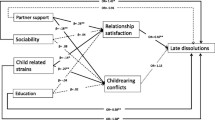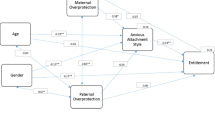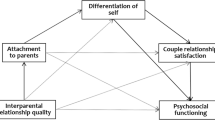Abstract.
Background:
Recollections of cold and overprotective behaviors from parents have been hypothesized to lead to the presence of mental disorders in young adulthood through their detrimental effects on individuals’ satisfaction in later partner relationships. Previous studies have not explicitly tested, however, whether partner relationship satisfaction mediates the longitudinal relationship from parental bonds to DSMIII-R disorders in young adults.
Methods:
We examined: (1) whether recollections of parental bonds in the first 16 years of life were related to the prevalence of DSMIII-R mental disorders in young adulthood, and (2) whether young adults’ satisfaction with current partner relationships mediated these links. Data were used from 1,581 Dutch young adults aged 18–34 years, who were interviewed in three waves (1996, 1997, and 1999) of a nationwide epidemiological study
Results:
Structural Equation Models demonstrated that recollections of caring, non-intrusive parenting behaviors were significantly, negatively associated with the prevalence of mood and anxiety disorders (but not substance disorders) in young adulthood. The satisfaction with current partner relationships did not mediate these negative associations.
Conclusion:
Results replicate and extend earlier findings from the National Comorbidity Survey (Enns et al. 2002), demonstrating that mental disorders are directly related to people’s recollections of parental care and overprotection. Low-quality parental bonds were only related to internalizing types of psychopathology, however, and were of a modest strength. Results may indicate that there is relatively little cross-relationship continuity in the experience of intimacy between relationships with parents and with partners.
Similar content being viewed by others
References
American Psychiatric Association (1987) Diagnostic and statistical manual of mental disorders, rev. 3rd edition. Washington: APA
Anderson L, Stevens N (1993) Associations between early experiences with parents and well being in old age. J Geront: Psych Research 48:109–116
Arrindell WA, Emmelkamp PMG, Monsma A, Brilman E (1983) The role of perceived parental rearing practices in the aetiology of phobic disorders: A controlled study. Brit J Psychiatry 143:183–187
Arrindell WA, Hanewald GJFP, Kolk AM (1989) Cross-national constancy of dimensions of parental rearing style: The Dutch version of the Parental Bonding Instrument (PBI). Pers Indiv Diff 10:949–956
Baldwin MW (1992) Relational schemas and the processing of social information. Psych Bull 112(3):461–484
Baron RM, Kenny DA (1986) The moderator-mediator variable distinction in social psychological research: Conceptual, strategic, and statistical considerations. J Pers Soc Psych 51:1173–1182
Bartholomew K, Horowitz LM (1991) Attachment styles among young adults: A test of a four-category model. J Pers Soc Psych 61:226–244
Bernardi E, Jones M, Tennant C (1989) Quality of parenting in alcoholics and narcotic addicts. Brit J Psychiatry 154:677–682
Burbach DJ, Kashani JH, Rosenberg TK (1989) Parental bonding and depressive disorders in adolescents. J Child Psych Psychiatry 30:417–429
Carnelley KB, Pietromonaco PR, Jaffe K (1994) Depression, working models of others, and relationship functioning. J Pers Soc Psych 66:127–140
Collins NL, Read SJ (1990) Adult attachment, working models, and relationship quality in dating couples. J Pers Soc Psych 58(4):644–663
Cramer D, Donachie M (1999) Psychological health and change in closeness in platonic and romantic relationships. J Soc Psych 139:762–767
Dozier M, Stovall KC, Albus KE (1999) Attachment and psychopathology in adulthood. In: Cassidy J, Shaver PR (eds) Handbook of attachment: Theory, research, and clinical applications (pp. 497–519). New York: Guilford
Enns MW, Cox BJ, Clara I (2002) Parental bonding and adult psychopathology: Results from the US National Comorbidity Survey. Psych Med 32:997–1008
Farmer AE, Jenkins PL, Katz R, Ryder L (1990) Comparison of CATEGO derived ICD-8 and DSM-III classifications using the CIDI in severely ill subjects. Br J Psychiat 158:177–182
Feeney JA, Noller P (1990) Attachment style as a predictor of adult romantic relationships. J Pers Soc Psych 58:281–291
Furman W, Buhrmester D (1992) Age and sex in perceptions of networks of personal relationships. Child Dev 63:103–115
Gerlsma C, Emmelkamp PMG, Arrindell WA (1990) Anxiety, depression, and perception of early parenting: A meta-analysis. Clin Psych Rev 10:251–277
Gerlsma C, Snijders TAB, Van Duijn MAJ, Emmelkamp PMG (1997) Parenting and psychopathology: Differences in family members’ perceptions of parental rearing styles. Pers Ind Diff 23:271–282
Gittleman MG, Klein MH, Smider NA, Essex MJ (1998) Recollections of parental behaviour, adult attachment and mental health: Mediating and moderating effects. Psych Med 28:1443–1455
Jöreskog KG, Sörbom D (1993) LISREL 8: Structural equation modeling with the SIMPLIS command language. Chicago: SSI Inc
Kenny ME, Rice KG (1995) Attachment to parents and adjustment in late adolescent college students: Current status, applications, and future considerations. Couns Psych 23:433–451
Lopez FG, Gover MR (1993) Self-report measures of parent-adolescent attachment and separation-individuation: A selective review. J Couns Dev 71:560–569
MacKinnon AJ, Henderson AS, Andrews G (1993) Parental ‘affectionless control’ as an antecedent to adult depression:A risk factor refined. Psych Med 23:135–141
MacKinnon AJ, Henderson AS, Scott R, Duncan-Jones P (1989) The Parental Bond Instrument (PBI): An epidemiological study in a general population sample. Psych Med 19:1023–1034
Mudar P, Leonard KE, Soltysinski K (2001) Discrepant substance use and marital functioning in newlywed couples. J Cons Clin Psych 69(1):130–134
Overbeek G, Vollebergh W, Engels RCME, Meeus W (2003) Young adults’ relationship transitions and the incidence of mental disorders: A three-wave longitudinal study. Soc Psych Psychiatr Epidemiol 38:669–676
Overbeek G, Vollebergh W, De Graaf R, Engels RCME (2004) Associations between adult recollections of parental bonds and DSM-III-R disorders: A replication of the Enns et al. Study. In preparation
Parker G (1990) The Parental Bonding Instrument: A decade of research. Soc Psych Psychiatr Epidemiol 25:281–282
Parker GB, Barrett EA, Hickie IB (1992) From nurture to network: Examining links between perceptions of parenting received in childhood and social bonds in adulthood. Am J Psychiatry 149:877–885
Parker G, Tupling H, Brown LB (1979) A Parental Bonding Instrument. J Med Psych 52:1 10
Parkes CM, Stevenson-Hinde J (eds) (1982) The place of attachment in human behaviour. London: Tavistock Publishing
Rodgers B (1996) Reported parental behaviour and adult affective symptoms. 2. Mediating factors. Psych Med 26:63–77
Simpson JA (1990) Influence of attachment styles on romantic relationships. J Pers Soc Psych 59:971–980
Smeets RMW, Dingemans PMAJ (1993) Composite International Diagnostic Interview (CIDI), version 1.1.Amsterdam: WHO
Truant GS, Herscovitch J, Lohrenz JG (1987) The relationship of childhoood experience to the quality of marriage. Can J Psychiatry 145:479–482
Wilhelm K, Parker G (1990) Reliability of the Parental Bonding Instrument and Intimate Bond Measure scales. Aust N Z J Psychiatry 24:199–202
Wittchen H-U (1994) Reliability and validity studies of the WHO-Composite International Diagnostic Interview (CIDI): A critical review. J Psychiatry Res 28:57–84
Author information
Authors and Affiliations
Corresponding author
Rights and permissions
About this article
Cite this article
Overbeek, G., Vollebergh, W., Meeus, W. et al. Young adults’ recollections of parental bonds. Soc Psychiatry Psychiatr Epidemiol 39, 703–710 (2004). https://doi.org/10.1007/s00127-004-0806-9
Accepted:
Issue Date:
DOI: https://doi.org/10.1007/s00127-004-0806-9




